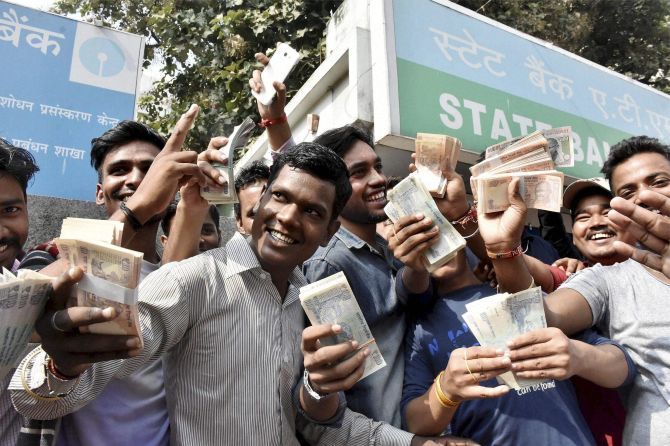'UBI is a tricky subject.'
'Our worry is the government could get rid of UPA's social welfare schemes targeted at the poor.'
Amit Agnihotri reports.

The Congress is wary of the Universal Basic Income proposal mentioned in the Economic Survey 2016-17.
The grand old party thinks the concept could dent the various social security nets created by the previous United Progressive Alliance regime to provide cushion to the poor.
According to Rajeev Gowda, who heads the All India Congress Committee research cell, the proposed UBI could dent social security schemes such as the Mahatma Gandhi National Rural Employment Guarantee Act, Sarv Shiksha Abhiyan, pensions, mid-day meal schemes, right to food and fertiliser subsidy, launched by the UPA.
"MGNREGA is a sort of UBI for rural areas. UBI is a tricky subject. Our worry is, through this concept, the government could get rid of UPA's social welfare schemes targeted at cushioning the " Gowda said.
Listing another reservation against the UBI, Gowda said the idea was not suitable to India's socio-economic environment and that it has suddenly become fashionable in the West, where rising joblessness, resulting from a slowdown in the manufacturing sector, is creating social tensions.
"Rich nations want to reduce their social tensions by assuring a UBI to the people," Gowda, a professor of economics, said.
The Congress lawmaker also talked about another bottleneck: The government, he said, might not push the concept vigorously as it had banked on generating a large corpus of money from demonetisation, but that didn't happen.
Despite repeated queries by the Opposition, both inside and outside Parliament, the government has still not disclosed how much money had been extinguished, saying that the Reserve Bank of India was still counting.
The UBI is the Bharatiya Janata Party's way of presenting its government as a pro-poor regime.
Describing it as the fastest means to reduce poverty, the Economic Survey said it would ensure some basic income for the genuinely poor.
'UBI is not a substitute for state capacity, it is a way of ensuring that state welfare transfers are more efficient so that the state can concentrate on other public goods,' the survey had said.
Contrary to the Congress' view, the survey batted for UBI saying it was more feasible in a country like India, where the scheme could be pegged at relatively low levels of income but still yield immense welfare gains.
However, the survey also listed three broad reservations against UBI: Whether it could reduce the incentive to work, whether income should be detached from employment and whether it should be unconditional.
Further, there are concerns over the financial and technical infrastructure needed to roll out an efficient UBI across the country, when a pilot project on direct beneficiary transfer in lieu of public distribution system in highly urbanised areas, such as Chandigarh and Puducherry, threw up several challenges.
The pilot was introduced and rolled back within two months in Puducherry, only to be reintroduced, said the survey.
'Despite some evidence on reduced leakages, independent evaluations emphasise the need for an improved digital financial infrastructure, even in these relatively urban settings,' said the survey, lending credence to concerns how the scheme would be implemented in the rural areas.
Realising that rolling out UBI may not be easy, the survey said time was ripe to at least discuss the idea.
Kindly note the image has been published only for representational purposes. Photograph: PTI












 © 2025
© 2025